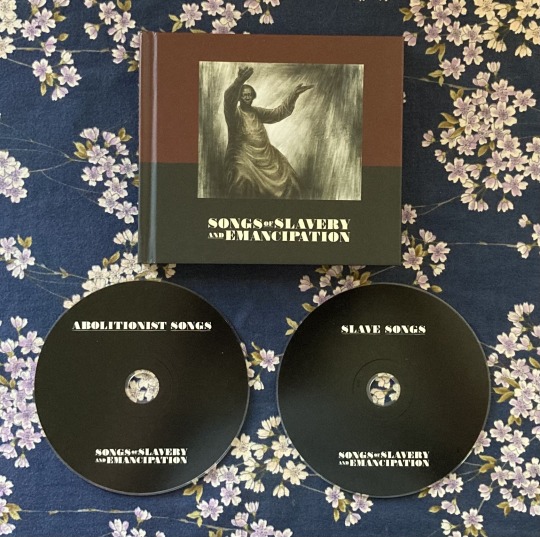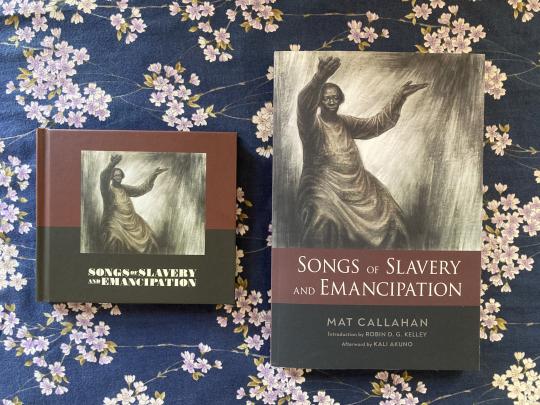#universitypressofmississippi
Explore tagged Tumblr posts
Text
Songs of Slavery and Emancipation

Songs of Slavery and Emancipation Releases June 17th, 2022 on Jalopy Records Order Now!
"To those songs I trace my first glimmering conception of the dehumanizing character of slavery. I can never get rid of that conception. Those songs still follow me, to deepen my hatred of slavery, and quicken my sympathies for my brethren in bonds." - Frederick Douglass

The Songs Of Slavery and Emancipation project presents recently discovered songs composed by enslaved people and explicitly calling for resistance to slavery. Some originate as early as 1800 and others as late as the outbreak of the Civil War. The project also includes long-lost songs of the abolitionist movement, some of which were written by fugitive slaves as well as free black people, challenging common misconceptions of abolitionism. Listen and order your copy at: jalopyrecords.bandcamp.com/album/songs-of-slavery-and-emancipation
Thirty one songs are presented in a beautiful hard cover bound double CD and digital download containing new performances in a traditional style by numerous contributing artists.
An accompanying 64 page liner notes booklet includes complete lyrics as well as reproductions of historic documents. The liner notes also include essays by the album’s producer Mat Callahan, scholar Robin D.G. Kelley and activist organizer Kali Akuno.
The album is also available via digital download and streaming services.

A companion full length book, to be published by the University Press of Mississippi, documents the sources of these newly released songs, as well as providing historic context: www.upress.state.ms.us/Books/S/Songs-of-Slavery-and-Emancipation
A documentary film documents the entire project and is available for screenings.
The CDs and book will be published in June, 2022 by the University Press of Mississippi in conjunction with Jalopy Records.

“These songs of slavery and emancipation, some written more than two hundred years ago, are not only important historically; they have a direct bearing on today’s movements for social and economic transformation. When you hear songs like “Nat Turner” or “Hymn of Freedom,” it’s almost as if they were written yesterday. They bring inspiration and revolutionary clarity to contemporary struggles. Songs of Slavery and Emancipation brings a whole era of resistance forward into the twenty-first century. To forget the lessons of the revolt and rebellion of the enslaved or the organizing of the abolitionist networks and the Underground Railroad is to condemn people to the false belief that because one of us is Black and the other is white we can’t unite, we don’t have anything in common, and we can’t work together. And this goes for people of all ethnicities, places of origin, and genders.
We must not forget this history. These songs can make an important contribution. They provide a popular art form that can help people understand all Americans’ history and participate in our contemporary struggles. Songs of Slavery and Emancipation carries crucial history that enlivens our collective memory and helps keep the spirit of resistance strong and moving forward.” - Kali Akuno Executive Director of Cooperation Jackson
Throughout the history of slavery, enslaved people organized resistance, escape, and rebellion. Sustaining them in this struggle was their music, some examples of which are sung to this day. While the existence of enslaved people’s songs, especially spirituals, is well known, their character is often misunderstood. Songs of enslaved people were not only lamentations of suffering or distractions from a life of misery. Some songs openly called for liberty and revolution, celebrating such heroes as Gabriel Prosser and Nat Turner, and, especially, celebrating the Haitian Revolution.
The fight for freedom also included fugitive slaves, free Black people, and their white allies who brought forth a set of songs that were once widely disseminated but are now largely forgotten, the songs of the abolitionists. Often composed by fugitive slaves and free Black people, and first appearing in the eighteenth century, these songs continued to be written and sung until the Civil War. As the movement expanded, abolitionists even published song books used at public meetings. Researcher and producer Mat Callahan presents in this collection recently discovered songs composed by enslaved people explicitly calling for resistance to slavery. Some of the songs originate as early as 1784 and others as late as the Civil War. He also presents long-lost songs of the abolitionist movement, some written by fugitive slaves and free Black people, challenging common misconceptions of abolitionism.
The Songs of Slavery and Emancipation album presents sixteen songs of enslaved people and fifteen abolitionist songs, placing them in proper historical context and making them available again to the general public. These songs not only express outrage at slavery but call for militant resistance and destruction of the slave system. There can be no doubt as to their purpose: the abolition of slavery, the emancipation of African American people, and a clear and undeniable demand for equality and justice for all humanity.
Track List:
Disc 1 Slave Songs
1. Agonizing, Cruel Slavery Days performed by Alden "Max" Smith
2. The Dirge of St. Malo (Louisiana Creole)
3. The Dirge of St. Malo (English) performed by Givonna Joseph vocal Kamau drum
4. Hymn of Freedom
5. Uncle Gabriel the Negro General
6. The Negro's Complaint performed by Berea Songs of Slavery and Emancipation Ensemble
7. Recognition March of the Independance of Hayti performed by Dr. Kathy Bullock piano, Cherokee Griffiths flute, Dr. James Dreiling trumpet
8. The African Hymn
9. Nat Turner
10. My Father, How Long?
11. March On
12. Children, We All Shall Be Free
13. Ol' Massa He Come Dancing Out
14. The Year of Jubilo
15. The Enlisted Men (the Negro Battle Hymn) performed by Berea Songs of Slavery and Emancipation Ensemble
16. Rebeldia na Bandabou Niata, On the tambú (drums) Rendel on the chapi(hoe) Rayson, Ompi tio and Broertje"
Disc 2 Abolitionist Songs
1. Song of the “Aliened American” performed by Sacred Harp singers from Western Massachusetts
2. A Song for Freedom performed by Berea Songs of Slavery and Emancipation Ensemble
3. Stole and Sold From Africa performed by Hannah From
4. Right On! performed by Sacred Harp singers from Western MA
5. Flight of the Bondman performed by Bern Ensemble
6. The Underground Railroad performed by Berea Songs of Slavery and Emancipation Ensemble
7. To The White People of America performed by New York Ensemble
8. Liberty performed by Sacred Harp singers from Western MA
9. The Band of Thieves performed by Bern Ensemble
10. The True Spirit performed by Bluegrass Ensemble Berea College
11. Come Join The Abolitionists performed by Sacred Harp singers from Western MA
12. The Voice of Six Hundred Thousand Nominally Free performed by Bern Ensemble
13. We’re Coming! We’re Coming! performed by New York Ensemble
14. Woman's Rights performed by Sacred Harp singers from Western MA
15. What Mean Ye? performed by Sacred Harp singers from Western MA
More information at: ArtHistoryPolitics.com
Album artists are available for performances.

#freedomsongs#radicalhistory#abolition#blacklivesmatter#shapenotesinging#cooperationjackson#universitypressofmississippi#americanhistory#historyofslavery#emancipation
4 notes
·
View notes
Photo

#conversationswithjohncheever #ScottDonaldson #UniversityPressOfMississippi #JohnCheever #Cheever #Ossining #OssiningNY #OssiningNewyork (at Peekskill, New York)
#cheever#scottdonaldson#universitypressofmississippi#ossiningnewyork#ossining#ossiningny#johncheever#conversationswithjohncheever
0 notes
Photo

Although badly in need of an update (it concludes just after the release of "Saving Private Ryan"), it's still one of the best in the Conversations With Filmmaker Series. The pieces give the career arch of the Hollywood titan; the talented youthwho impressed studio heads to get the directing job for "The Sugarland Express", and the first contemporary blockbuster, "Jaws". Spielberg's excellent track record, until coming to "The Color Purple" in which he's openly frets about taking on more adult content, and still stifling his way throughout the rest of the 80s until the year 1993, in which the articles become fixated on the boy become man. The theme carries on for the rest of the 1990s, and tips it's hit to the opening of DreamWorks and Spielberg's branching out as a producer. •••••••••• #stevenspielberg #spielberg #lesterdfriedman #conversation #film #filmset #filmmaker #filmschool #universitypressofmississippi #dırector #oscars #oscarwinner #green #recommended #goodreads #greatbook #casting #castingcall #castingdirector
#goodreads#film#filmmaker#stevenspielberg#filmset#lesterdfriedman#universitypressofmississippi#casting#castingdirector#spielberg#filmschool#greatbook#castingcall#oscarwinner#green#oscars#recommended#dırector#conversation
0 notes